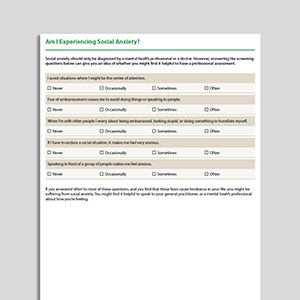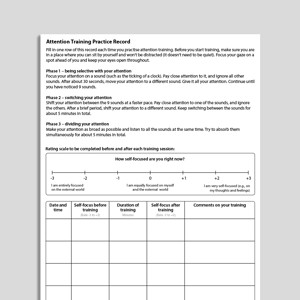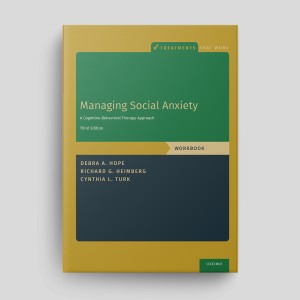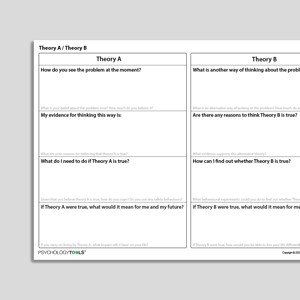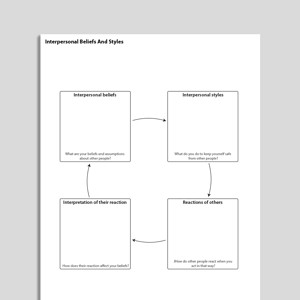Social Anxiety Disorder
Social anxiety disorder (SAD), also known as social phobia, is a mental health condition characterized by an intense fear of social situations where one might be judged, embarrassed, or humiliated. This persistent fear often leads to avoidance of social interactions or enduring them with intense distress. Unlike ordinary shyness, social anxiety disorder significantly interferes with daily functioning, relationships, and quality of life. It can manifest in specific situations, such as public speaking, or more broadly across various social contexts. Evidence-based treatments, particularly cognitive-behavioral therapy (CBT), have been shown to be effective in reducing symptoms and helping individuals regain confidence in social settings.
Showing 1 to 43 of 43 results
Cognitive Distortions – Unhelpful Thinking Styles (Common)
Cognitive Distortions – Unhelpful Thinking Styles (Common)
Cognitive Distortions – Unhelpful Thinking Styles (Extended)
Cognitive Distortions – Unhelpful Thinking Styles (Extended)
Magnification And Minimization
Magnification And Minimization
Exposures For Fear Of Appearing Anxious
Exposures For Fear Of Appearing Anxious
Am I Experiencing Social Anxiety?
Am I Experiencing Social Anxiety?
Attention Training Practice Record
Attention Training Practice Record
Recognizing Social Anxiety Disorder
Recognizing Social Anxiety Disorder
Managing Social Anxiety (Third Edition): Workbook
Managing Social Anxiety (Third Edition): Workbook
Managing Social Anxiety (Third Edition): Therapist Guide
Managing Social Anxiety (Third Edition): Therapist Guide
What Is Social Anxiety Disorder?
What Is Social Anxiety Disorder?
Cognitive Behavioral Model Of Social Phobia (Clark, Wells, 1995)
Cognitive Behavioral Model Of Social Phobia (Clark, Wells, 1995)
What Keeps Social Anxiety Going?
What Keeps Social Anxiety Going?
Understanding Social Anxiety
Understanding Social Anxiety
Therapy Blueprint For Social Anxiety
Therapy Blueprint For Social Anxiety
Interpersonal Beliefs And Styles
Interpersonal Beliefs And Styles
Links to external resources
Psychology Tools makes every effort to check external links and review their content. However, we are not responsible for the quality or content of external links and cannot guarantee that these links will work all of the time.
Assessment
-
Social Phobia Inventory (SPIN)
| Connor, Davidson, Churchill, Sherwood, Weisler, Foa | 2000
- Scale
-
Social Phobia Scale
| Mattick, Clarke | 1995
- Scale
-
Brief Fear of Negative Evaluation Scale
| Leary | 1983
- Scale
Guides and workbooks
- Social phobia: patient treatment manual | Clinical Research Unit for Anxiety and Depression (CRUfAD)
- Social Anxiety (An NHS Self-Help Guide) | Lesley Maunder, Lorna Cameron | 2020
Information Handouts
-
Social Anxiety (Information Handouts)
| Centre For Clinical Interventions
- What is social anxiety?
- What can be done about social anxiety?
- Breathing retraining
- Progressive muscle relaxation
- Improving how you feel
- Thinking and feeling
- Analysing your thinking
- Changing your thinking
- Unhelpful thinking styles
- What are core beliefs?
- Situational exposure
- What are safety behaviors?
- Staying healthy
Information (Professional)
- Assertive defense of the self (A more effective treatment focus for social phobia?) | Padesky | 1985
Presentations
- Cognitive-Behavioral Therapies for Social Anxiety Disorder: Integrating the 3 Waves of Evidence-Based Therapy | Larry Cohen | 2022
- Cognitive-Behavioral Therapies for Social Anxiety Disorder: Integrating the 3 Waves of Evidence-Based Therapy | Larry Cohen
Self-Help Programmes
-
Stepping Out Of Social Anxiety (Workbook)
| Centre For Clinical Interventions | 2020
- Module 1: Understanding Social Anxiety
- Module 2: Overcoming Negative Thinking
- Module 3: Overcoming Avoidance
- Module 4: Behavioral Experiment Stepladders
- Module 5: Safety Behaviors
- Module 6: The Role Of Attention
- Module 7: How I Think I Appear To Others
- Module 8: Challenging Core Beliefs
- Module 9: Strengthening New Core Beliefs
- Module 10: Maintaining Your Gains And Dealing With Setbacks
Treatment Guide
- Mindfulness and acceptance-based group therapy for social anxiety disorder: a treatment manual | Fleming, Kocovski | 2009
- Comprehensive cognitive behavior therapy for social phobia: a treatment manual | Deborah Roth Ledley, Edna B. Foa, Jonathan D. Huppert (in consultation with David M. Clark) | 2005
- Comprehensive cognitive behavior therapy for social phobia: a treatment manual | Ledley, Foa, Huppert, Clark | 2006
- NICE Guidelines For Social Anxiety Disorder | NICE | 2013
Worksheets
-
Social Anxiety (Worksheets)
| Centre For Clinical Interventions
- Anxiety symptoms record
- Breathing rate record
- Monitoring your relaxation level
- Weekly activity schedule
- Weekly goals record
- Making the connection
- Thought diary 1
- Thought diary 2
- Thought diary 3
- Thought diary (tri-fold)
- Core beliefs worksheet
- Situational exposure: building steps
- Behavioral experiments
- Healthy me
- Goal setting: end of therapy
-
Anxiety (Worksheets)
| Centre For Clinical Interventions
- Anxiety Symptoms Record
- Breathing Rate Record
- Monitoring Relaxation
- Situational Exposure Diary
- Making The Connection
- Thought Diary 1
- Thought Diary 2
- Thought Diary 3
- Thought Diary (Tri-Fold)
- Behavioral Experiment Worksheet
Recommended Reading
- Task concentration training and fear of blushing | Bögels, Mulkens, De Jong | 1997
What Is Social Anxiety?
Social anxiety disorder is marked by persistent and excessive fear of social interactions or performance situations where scrutiny by others is possible. According to DSM-5, it involves a marked fear of situations such as speaking in public, meeting new people, or being observed while eating or drinking. A core fear is acting in a way that result in humiliation or embarrassment, which leads individuals to avoid these situations or endure them with intense anxiety. Symptoms must persist for six months or more and cause significant distress or impairment in functioning to meet diagnostic criteria.
ICD-11 criteria similarly highlight persistent and excessive fear of social interactions, particularly those involving unfamiliar people. Avoidance behaviors, self-monitoring, and anticipatory anxiety are common features, resulting in reduced social participation and quality of life.
Incidence and Predictors of Social Anxiety
Social anxiety disorder is one of the most common anxiety disorders, affecting approximately 7–12% of the population during their lifetime (Kessler et al., 2005). Predictors include genetic, environmental, and psychological factors. Family and twin studies indicate a heritable component, with heightened reactivity in brain areas like the amygdala linked to exaggerated fear responses in social situations (Etkin & Wager, 2007). Early negative experiences, such as bullying or rejection, and parenting styles characterized by overcontrol or criticism increase vulnerability to social anxiety (Leichsenring & Leweke, 2017). Cognitive factors, such as attentional biases toward negative feedback and self-critical thinking, also contribute to the development and maintenance of social anxiety (Clark & Wells, 1995).
Psychological Models and Theories of Social Anxiety
The cognitive behavioral model by Clark and Wells (1995) is one of the most influential frameworks for understanding social anxiety disorder. This model emphasizes how individuals with social anxiety interpret social situations as threatening and engage in self-focused attention and safety behaviors, such as avoiding eye contact or rehearsing conversations, to mitigate perceived risks. These behaviors, while reducing immediate distress, prevent individuals from learning that feared outcomes are unlikely, which maintains their anxiety over time. Treatment focuses on examining the negative effects of self-focused attention and safety behaviours, video feedback to correct negative self-images, and behavioural experiments to test fearful predictions (e.g., Clark et al., 2006).
The Heimberg / Hope model of social anxiety disorder (Heimberg & Becker 2002; Hope, Heimberg, Turk, 2006) emphasizes distorted beliefs about social interactions, safety behaviors, and post-event rumination as key maintaining factors. Treatment integrates psychoeducation, cognitiverestructuring to challenge negative beliefs, and exposure therapy to confront feared situations gradually, reducing avoidance and reinforcing confidence. In group therapy settings, individuals benefit from practicing social skills, receiving feedback, and learning from peers.
The Trower and Gilbert model of social anxiety (1989) highlights evolved mechanisms that drive fear of negative evaluation and the need for social acceptance, which are related to securing resources and physiological regulation. Dysfunctional social anxiety arises when overactive defenses, such as gaze avoidance or submissive behaviors, are triggered by perceived inferiority or low social rank. These responses undermine confidence and perpetuate a failure cycle. Modern pressures, like competition for social status, may intensify these effects. Drawing on this model, Compassion-Focused Therapy (CFT; Gilbert, 2020) targets self-criticism and helps recalibrate threat responses, fostering self-compassion and confidence in social interactions (e.g., Henderson, 2011).
Evidence-Based Psychological Approaches for Social Anxiety
Cognitive behavioral therapy (CBT) is an effective treatment for social anxiety disorder, with a robust evidence base supporting its efficacy. CBT helps individuals identify and challenge negative self-perceptions and catastrophic thoughts about social interactions. Through behavioral techniques such as exposure and behavioural experimentation, patients are gradually introduced to feared social scenarios, allowing them to reduce avoidance, disconfirm distorted beliefs, and build confidence over time. Research consistently demonstrates substantial and lasting reductions in social anxiety symptoms following CBT (Leichsenring et al., 2014).
Acceptance and Commitment Therapy (ACT) offers a complementary approach, focusing on helping individuals accept social fears rather than attempting to eliminate them (e.g., Craske et al., 2014). ACT encourages patients to engage in value-driven actions despite discomfort, reducing the overall impact of social anxiety on their functioning. By shifting focus from avoidance to meaningful engagement, ACT helps individuals improve their quality of life. Research suggests that ACT is a promising way to improve attentional bias, emotion regulation, and safety/avoidance behaviors in social anxiety (Caletti et al., 2022)
CBT-based group therapy has also been shown to be highly effective, providing a safe and supportive setting for individuals to practice social skills, confront fears, and receive feedback. Group therapy normalizes experiences of social anxiety, fostering mutual encouragement and reducing feelings of isolation. Research highlights its effectiveness in reducing fear of judgment and improving social functioning (Heimberg et al., 1990).
There is evidence to suggest that pharmacological treatments can be helpful for individuals experiencing social anxiety (e.g., Mayo-Wilson et al., 2014; Williams et al., 2020).
Resources for Working with Social Anxiety
Psychology Tools offers a range of resources for understanding and addressing social anxiety, including:
Cognitive behavioral formulations and models of social anxiety
Handouts explaining the maintenance of social anxiety
Worksheets for challenging negative social beliefs
Exercises for exposure therapy, reducing avoidance behaviors, and addressing self-focused attention
Mindfulness practices for managing self-focused attention and distress
Compassion-focused resources for addressing shame and self-criticism
References and Further Reading
Blanco, C., Heimberg, R. G., Schneier, F. R., Fresco, D. M., & Liebowitz, M. R. (2010). Social anxiety disorder: Epidemiology, burden, and pharmacotherapy. Psychiatric Clinics of North America, 33(4), 835–845.
Caletti, E., Massimo, C., Magliocca, S., Moltrasio, C., Brambilla, P., & Delvecchio, G. (2022). The role of the acceptance and commitment therapy in the treatment of social anxiety: An updated scoping review. Journal of Affective Disorders, 310, 174-182.
Clark, D. M., Ehlers, A., Hackmann, A., McManus, F., Fennell, M., Grey, N., et al. (2006). Cognitive therapy versus exposure and applied relaxation in social phobia: A randomized controlled trial. Journal of Consulting and Clinical Psychology, 74, 568–578.
Clark, D. M., & Wells, A. (1995). A cognitive model of social phobia. In R. G. Heimberg, M. R. Liebowitz, D. A. Hope, & F. R. Schneier (Eds.), Social phobia: Diagnosis, assessment, and treatment (pp. 69–93). Guilford Press.
Craske, M. G., Niles, A. N., Burklund, L. J., et al. (2014). A randomized controlled trial of acceptance and commitment therapy and cognitive-behavioral therapy for social anxiety disorder: Outcome and mechanisms of change. Journal of Consulting and Clinical Psychology, 82(5), 1034–1047.
Etkin, A., & Wager, T. D. (2007). Functional neuroimaging of anxiety: A meta-analysis of emotional processing in PTSD, social anxiety disorder, and specific phobia. American Journal of Psychiatry, 164(10), 1476–1488.
Gilbert, P. (2001). Evolution and social anxiety: The role of attraction, social competition, and social hierarchies. Psychiatric Clinics, 24(4), 723–751.
Gilbert, P. (2020). Compassion: From its evolution to a psychotherapy. Frontiers in Psychology, 11, 586161.
Heimberg, R. G., Salzman, D. G., Holt, C. S., & Blendell, K. A. (1990). Cognitive-behavioral group therapy for social phobia: Effectiveness at five-year follow-up. Cognitive Therapy and Research, 14(1), 1–14.
Heimberg, R. G., & Becker, R. E. (2002). Cognitive-behavioral group therapy for social phobia. New York: Guilford Press.
Henderson, L. (2021). The shyness workbook: Transform social anxiety using your compassionate mind. Robinson.
Hope, D. A., Heimberg, R. G., & Turk, C. L. (2006). Managing social anxiety: A cognitive-behavioral approach. Oxford: Oxford University Press.
Kessler, R. C., Berglund, P., Demler, O., Jin, R., Merikangas, K.R., & Walters, E. E. (2005). Lifetime prevalence and age-of-onset distributions of DSM-IV disorders in the National Comorbidity Survey Replication. Archives of General Psychiatry, 62(6), 593–602.
Leichsenring, F., & Leweke, F. (2017). Social anxiety disorder. New England Journal of Medicine, 376(3), 2255–2264.
Leichsenring, F., Salzer, S., Beutel, M., Herpertz, S., Hoyer, J., & Leibing, E. (2014). Psychodynamic therapy and CBT in social anxiety disorder: A multicenter randomized controlled trial. American Journal of Psychiatry, 171(10), 1094–1102.
Mayo-Wilson, E., Dias, S., Mavranezouli, I., Kew, K., Clark, D. M., Ades, A. E., & Pilling, S. (2014). Psychological and pharmacological interventions for social anxiety disorder in adults: a systematic review and network meta-analysis. The Lancet Psychiatry, 1, 368-376.
Trower, P., & Gilbert, P. (1989). New theoretical conceptions of social anxiety and social phobia. Clinical Psychology Review, 9, 19-35.
Williams, T., McCaul, M., Schwarzer, G., Cipriani, A., Stein, D. J., & Ipser, J. (2020). Pharmacological treatments for social anxiety disorder in adults: a systematic review and network meta-analysis. Acta Neuropsychiatrica, 32, 169-176.





















